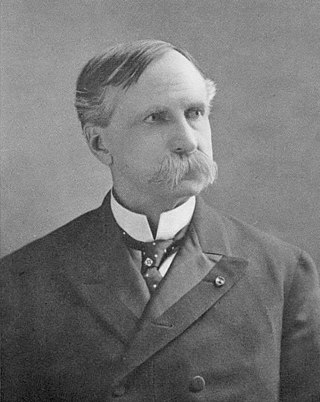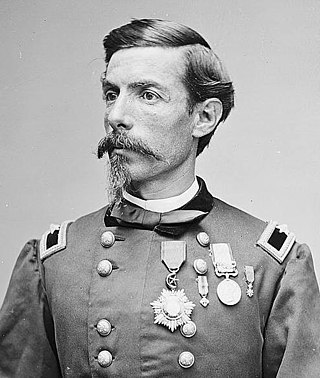Related Research Articles

Knights of Labor, officially Noble and Holy Order of the Knights of Labor, was an American labor federation active in the late 19th century, especially the 1880s. It operated in the United States as well in Canada, and had chapters also in Great Britain and Australia. Its most important leader was Terence V. Powderly. The Knights promoted the social and cultural uplift of the worker, and demanded the eight-hour day. In some cases it acted as a labor union, negotiating with employers, but it was never well organized or funded. It was notable in its ambition to organize across lines of gender and race and in the inclusion of both skilled and unskilled labor. After a rapid expansion in the mid-1880s, it suddenly lost its new members and became a small operation again. The Knights of Labor had served, however, as the first mass organization of the white working class of the United States.

Nelson Wilmarth Aldrich was a prominent American politician and a leader of the Republican Party in the United States Senate, where he represented Rhode Island from 1881 to 1911. By the 1890s, he was one of the "Big Four" key Republicans who largely controlled the major decisions of the Senate, along with Orville H. Platt, William B. Allison, and John Coit Spooner. Because of his impact on national politics and central position on the pivotal Senate Finance Committee, he was referred to by the press and public alike as the "general manager of the Nation", dominating tariff and monetary policy in the first decade of the 20th century.

Charles Francis Adams Jr. was an American author, historian, and railroad and park commissioner who served as the president of the Union Pacific Railroad from 1884 to 1890. He served as a colonel in the Union Army during the American Civil War. After the war, he was a railroad regulator and executive, an author of historical works, and a member of the Massachusetts Park Commission.

Henry Bowen Anthony was a United States newspaperman and political figure. He served as editor and was later part owner of the Providence Journal. He was the 21st Governor of Rhode Island, serving between 1849 and 1851 as a member of the Whig Party. Near the end of the 1850s, he was elected to the Senate by the Rhode Island Legislature and was re-elected 4 times. He would be twice elected to the Senate's highest post as President pro tempore during the Grant administration, and served until his death in 1884.

Prince Henry of Prussia was a younger brother of German Emperor William II and a Prince of Prussia. He was also a grandson of Queen Victoria. A career naval officer, he held various commands in the Imperial German Navy and eventually rose to the rank of Grand Admiral and Generalinspekteur der Marine.

William Sprague IV was the 27th Governor of Rhode Island from 1860 to 1863, and U.S. Senator from 1863 to 1875. He participated in the First Battle of Bull Run during the American Civil War while he was a sitting Governor.

Carroll Davidson Wright was an American statistician. Wright is best known for his title as the first U.S. Commissioner of Labor, serving in that capacity from 1885 to 1905.

William Warner Hoppin was the 24th Governor of Rhode Island from 1854 to 1857.

Stephen Wheeler Downey was a lawyer and politician in Wyoming. A Union Army veteran of the American Civil War, he was an early white settler of Wyoming, and served as its treasurer, auditor, and delegate to Congress. After statehood, Downey continued to serve in local and state office, including Speaker of the Wyoming House of Representatives.

Asa Bird Gardiner was a controversial American soldier, attorney, and district attorney for New York County from 1898 to 1900.

"Alfred" Napoléon Duffié was a French-American soldier and diplomat who served in the Crimean War and the American Civil War.

August Hjalmar Edgren was a Swedish-American linguist, professor, and author.

James William Hyatt was Treasurer of the United States from 1887 to 1889. He had previously served as Bank Commissioner for the State of Connecticut, and United States Bank Examiner for Connecticut and Rhode Island. He served as a Democratic member of the Connecticut House of Representatives in 1875 and 1876, a member of the Connecticut Senate in 1884, and he was Warden of the Borough of Norwalk from 1877 to 1878, from 1880 to 1882, and from 1885 to 1887.

Reuben May was an American farmer and populist politician. He was a member of the Wisconsin State Assembly, representing the western half of Vernon County during the 1870 and 1872 sessions. He was also twice a candidate for governor of Wisconsin, running on the Greenback ticket in 1879 and the Union Labor ticket in 1890. Earlier in life, he served as a colonel in the Union Army during the American Civil War.

Rear Admiral Philip Henry Cooper was an officer in the United States Navy. He fought in the American Civil War and served as Superintendent of the United States Naval Academy and as commander-in-chief of the United States Asiatic Fleet.
The following list is a Bibliography of American Civil War Union military unit histories. More details on each book are available at WorldCat.

William S. Hayward was an American banker, baker, and politician who served as mayor of Providence, Rhode Island, from 1881 until 1884.

William R. Walker was an American architect from Providence, Rhode Island, who was later the senior partner of William R. Walker & Son.

Horatio Rogers Jr. was an American lawyer, judge, and Union Army officer in the American Civil War. He was the Attorney General of Rhode Island from 1864 to 1867 and again from 1888 to 1889. From 1891 to 1903, he served as an Associate Justice of the Rhode Island Supreme Court.
Amasa Sprague was an American businessman and politician from Rhode Island. Born into an influential family, Sprague was a multi-millionaire textile industrialist until the Panic of 1873. He held various political offices in Rhode Island and was the Democratic nominee for Governor of Rhode Island in the 1886 election.
References
- 1 2 Palmer Hopkins, William (1903). The Seventh Regiment Rhode Island Volunteers in the Civil War, 1862-1865. Snow & Farnham.
- 1 2 The Samuel Gompers Papers. University of Illinois Press. 1986. ISBN 9780252033896.
- ↑ "A butler advocate's walk". New York Times. May 21, 1884. Retrieved 25 February 2023.
- ↑ "Labor Old Timers". The Dillon Tribune. September 19, 1902. Retrieved 25 February 2023.